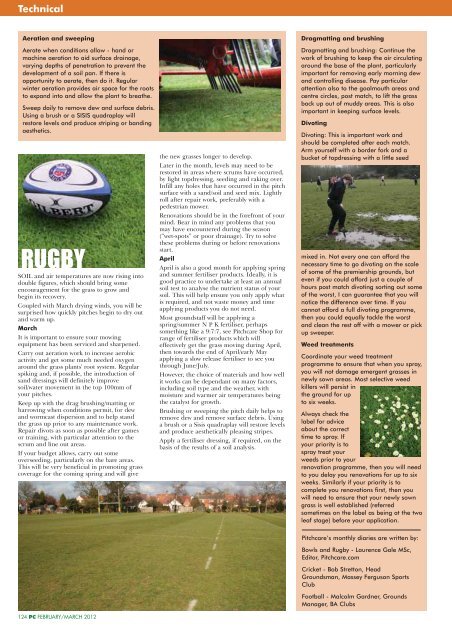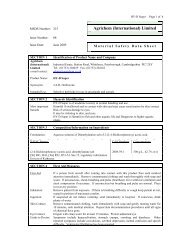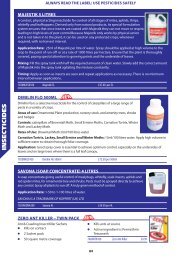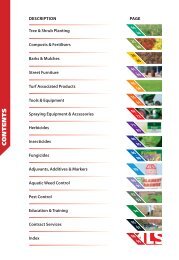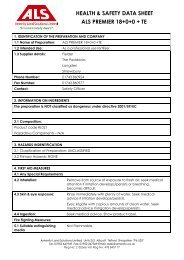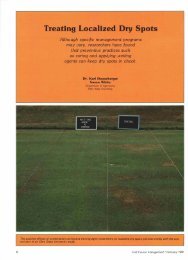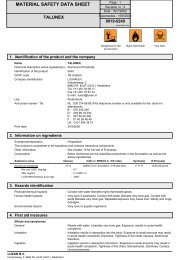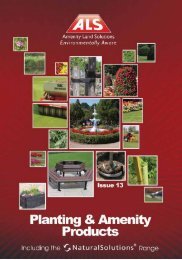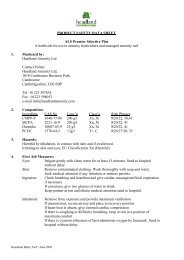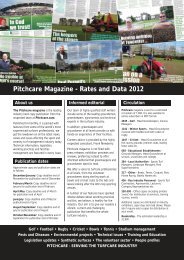these Open Championship Clubs choose to relief grind - Pitchcare
these Open Championship Clubs choose to relief grind - Pitchcare
these Open Championship Clubs choose to relief grind - Pitchcare
Create successful ePaper yourself
Turn your PDF publications into a flip-book with our unique Google optimized e-Paper software.
Technical<br />
Aeration and sweeping<br />
Aerate when conditions allow - hand or<br />
machine aeration <strong>to</strong> aid surface drainage,<br />
varying depths of penetration <strong>to</strong> prevent the<br />
development of a soil pan. If there is<br />
opportunity <strong>to</strong> aerate, then do it. Regular<br />
winter aeration provides air space for the roots<br />
<strong>to</strong> expand in<strong>to</strong> and allow the plant <strong>to</strong> breathe.<br />
Sweep daily <strong>to</strong> remove dew and surface debris.<br />
Using a brush or a SISIS quadraplay will<br />
res<strong>to</strong>re levels and produce striping or banding<br />
aesthetics.<br />
RUGBY<br />
SOIL and air temperatures are now rising in<strong>to</strong><br />
double figures, which should bring some<br />
encouragement for the grass <strong>to</strong> grow and<br />
begin its recovery.<br />
Coupled with March drying winds, you will be<br />
surprised how quickly pitches begin <strong>to</strong> dry out<br />
and warm up.<br />
March<br />
It is important <strong>to</strong> ensure your mowing<br />
equipment has been serviced and sharpened.<br />
Carry out aeration work <strong>to</strong> increase aerobic<br />
activity and get some much needed oxygen<br />
around the grass plants' root system. Regular<br />
spiking and, if possible, the introduction of<br />
sand dressings will definitely improve<br />
soil/water movement in the <strong>to</strong>p 100mm of<br />
your pitches.<br />
Keep up with the drag brushing/matting or<br />
harrowing when conditions permit, for dew<br />
and wormcast dispersion and <strong>to</strong> help stand<br />
the grass up prior <strong>to</strong> any maintenance work.<br />
Repair divots as soon as possible after games<br />
or training, with particular attention <strong>to</strong> the<br />
scrum and line out areas.<br />
If your budget allows, carry out some<br />
overseeding, particularly on the bare areas.<br />
This will be very beneficial in promoting grass<br />
coverage for the coming spring and will give<br />
124 PC FEBRUARY/MARCH 2012<br />
the new grasses longer <strong>to</strong> develop.<br />
Later in the month, levels may need <strong>to</strong> be<br />
res<strong>to</strong>red in areas where scrums have occurred,<br />
by light <strong>to</strong>pdressing, seeding and raking over.<br />
Infill any holes that have occurred in the pitch<br />
surface with a sand/soil and seed mix. Lightly<br />
roll after repair work, preferably with a<br />
pedestrian mower.<br />
Renovations should be in the forefront of your<br />
mind. Bear in mind any problems that you<br />
may have encountered during the season<br />
(“wet-spots” or poor drainage). Try <strong>to</strong> solve<br />
<strong>these</strong> problems during or before renovations<br />
start.<br />
April<br />
April is also a good month for applying spring<br />
and summer fertiliser products. Ideally, it is<br />
good practice <strong>to</strong> undertake at least an annual<br />
soil test <strong>to</strong> analyse the nutrient status of your<br />
soil. This will help ensure you only apply what<br />
is required, and not waste money and time<br />
applying products you do not need.<br />
Most groundstaff will be applying a<br />
spring/summer N P K fertiliser, perhaps<br />
something like a 9:7:7, see <strong>Pitchcare</strong> Shop for<br />
range of fertiliser products which will<br />
effectively get the grass moving during April,<br />
then <strong>to</strong>wards the end of April/early May<br />
applying a slow release fertiliser <strong>to</strong> see you<br />
through June/July.<br />
However, the choice of materials and how well<br />
it works can be dependant on many fac<strong>to</strong>rs,<br />
including soil type and the weather, with<br />
moisture and warmer air temperatures being<br />
the catalyst for growth.<br />
Brushing or sweeping the pitch daily helps <strong>to</strong><br />
remove dew and remove surface debris. Using<br />
a brush or a Sisis quadraplay will res<strong>to</strong>re levels<br />
and produce aesthetically pleasing stripes.<br />
Apply a fertiliser dressing, if required, on the<br />
basis of the results of a soil analysis.<br />
Dragmatting and brushing<br />
Dragmatting and brushing: Continue the<br />
work of brushing <strong>to</strong> keep the air circulating<br />
around the base of the plant, particularly<br />
important for removing early morning dew<br />
and controlling disease. Pay particular<br />
attention also <strong>to</strong> the goalmouth areas and<br />
centre circles, post match, <strong>to</strong> lift the grass<br />
back up out of muddy areas. This is also<br />
important in keeping surface levels.<br />
Divoting<br />
Divoting: This is important work and<br />
should be completed after each match.<br />
Arm yourself with a border fork and a<br />
bucket of <strong>to</strong>pdressing with a little seed<br />
mixed in. Not every one can afford the<br />
necessary time <strong>to</strong> go divoting on the scale<br />
of some of the premiership grounds, but<br />
even if you could afford just a couple of<br />
hours post match divoting sorting out some<br />
of the worst, I can guarantee that you will<br />
notice the difference over time. If you<br />
cannot afford a full divoting programme,<br />
then you could equally tackle the worst<br />
and clean the rest off with a mower or pick<br />
up sweeper.<br />
Weed treatments<br />
Coordinate your weed treatment<br />
programme <strong>to</strong> ensure that when you spray,<br />
you will not damage emergent grasses in<br />
newly sown areas. Most selective weed<br />
killers will persist in<br />
the ground for up<br />
<strong>to</strong> six weeks.<br />
Always check the<br />
label for advice<br />
about the correct<br />
time <strong>to</strong> spray. If<br />
your priority is <strong>to</strong><br />
spray treat your<br />
weeds prior <strong>to</strong> your<br />
renovation programme, then you will need<br />
<strong>to</strong> you delay you renovations for up <strong>to</strong> six<br />
weeks. Similarly if your priority is <strong>to</strong><br />
complete you renovations first, then you<br />
will need <strong>to</strong> ensure that your newly sown<br />
grass is well established (referred<br />
sometimes on the label as being at the two<br />
leaf stage) before your application.<br />
<strong>Pitchcare</strong>’s monthly diaries are written by:<br />
Bowls and Rugby - Laurence Gale MSc,<br />
Edi<strong>to</strong>r, <strong>Pitchcare</strong>.com<br />
Cricket - Bob Stret<strong>to</strong>n, Head<br />
Groundsman, Massey Ferguson Sports<br />
Club<br />
Football - Malcolm Gardner, Grounds<br />
Manager, BA <strong>Clubs</strong>


